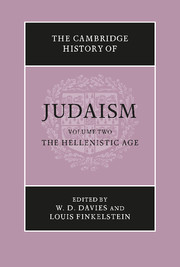Book contents
- Frontmatter
- 1 The archeology of Hellenistic Palestine
- 2 The political and social History of Palestine from Alexander to Antiochus III (333–187 B.C.E.)
- 3 Hebrew, Aramaic and Greek in the Hellenistic age
- 4 The Diaspora in the Hellenistic age
- 5 The interpenetration of Judaism and Hellenism in the pre-Maccabean period
- 6 The men of the Great Synagogue (circa 400–170 .b.c.e.)
- 7 Pharisaic leadership after the Great Synagogue (170 B.C.E.–135 C.E.)
- 8 Antiochus IV
- 9 The Hasmonean revolt and the Hasmonean dynasty
- 10 Jewish literature in Hebrew and Aramaic in the Greek era
- 11 Jewish–Greek literature of the Greek period
- 12 The Apocrypha and Pseudepigrapha of the Hellenistic period
- 13 The book of Daniel
- 14 The matrix of apocalyptic
- 15 The Septuagint and its Hebrew text
- 16 The Targumim
- 17 The Samaritans
- 18 The growth of anti-Judaism or the Greek attitude towards the Jews
- Bibliographies
- Chronological table
- Index
- References
8 - Antiochus IV
Published online by Cambridge University Press: 28 March 2008
- Frontmatter
- 1 The archeology of Hellenistic Palestine
- 2 The political and social History of Palestine from Alexander to Antiochus III (333–187 B.C.E.)
- 3 Hebrew, Aramaic and Greek in the Hellenistic age
- 4 The Diaspora in the Hellenistic age
- 5 The interpenetration of Judaism and Hellenism in the pre-Maccabean period
- 6 The men of the Great Synagogue (circa 400–170 .b.c.e.)
- 7 Pharisaic leadership after the Great Synagogue (170 B.C.E.–135 C.E.)
- 8 Antiochus IV
- 9 The Hasmonean revolt and the Hasmonean dynasty
- 10 Jewish literature in Hebrew and Aramaic in the Greek era
- 11 Jewish–Greek literature of the Greek period
- 12 The Apocrypha and Pseudepigrapha of the Hellenistic period
- 13 The book of Daniel
- 14 The matrix of apocalyptic
- 15 The Septuagint and its Hebrew text
- 16 The Targumim
- 17 The Samaritans
- 18 The growth of anti-Judaism or the Greek attitude towards the Jews
- Bibliographies
- Chronological table
- Index
- References
Summary
For about twenty years the Jews of Palestine lived peacefully under the system of government established by Antiochus III after his conquest of the country in 200 b.c.e. (see above, chapter 2). Some of the leading families may for personal or traditional reasons have preferred the Ptolemaic rule, but to the majority it made no difference whether they were governed from Alexandria or Antioch. The son and successor of the conqueror, Seleucus IV (187–175 b.c.e.), continued, during the first part of his reign, his father's wise and tolerant policy and made contributions to the sacrifices in the Temple in Jerusalem. When troubles arose towards the end of Seleucus IV's reign, their causes must be sought in internal tension and strife between various factions or groups within the Jewish community. Already in the third century b.c.e. the antagonism between the rich and influential Tobiads and the Oniads, who held the office of high priest, had disclosed a serious disagreement within the leading Jewish circles as to the attitude towards the problems of coexistence with the surrounding peoples and a certain assimilation of the dominant Greek–Hellenistic culture (see chapter 2).
The first incident in this new series of quarrels among the Jews was the clash between the high priest, Onias III, and the epistatēs or financial administrator of the Temple, a certain Simon. As the latter was unable to secure the post of agoranomos or overseer of the market for himself on account of the high priest's opposition, he turned to the Seleucid governor of the province of Coele-Syria and Phoenicia, Apollonius, son of Menestheus, and revealed to him the existence of large funds in the Temple treasury, suggesting that the money might be appropriated by the Syrian king.
- Type
- Chapter
- Information
- The Cambridge History of Judaism , pp. 278 - 291Publisher: Cambridge University PressPrint publication year: 1990
References
- 1
- Cited by



